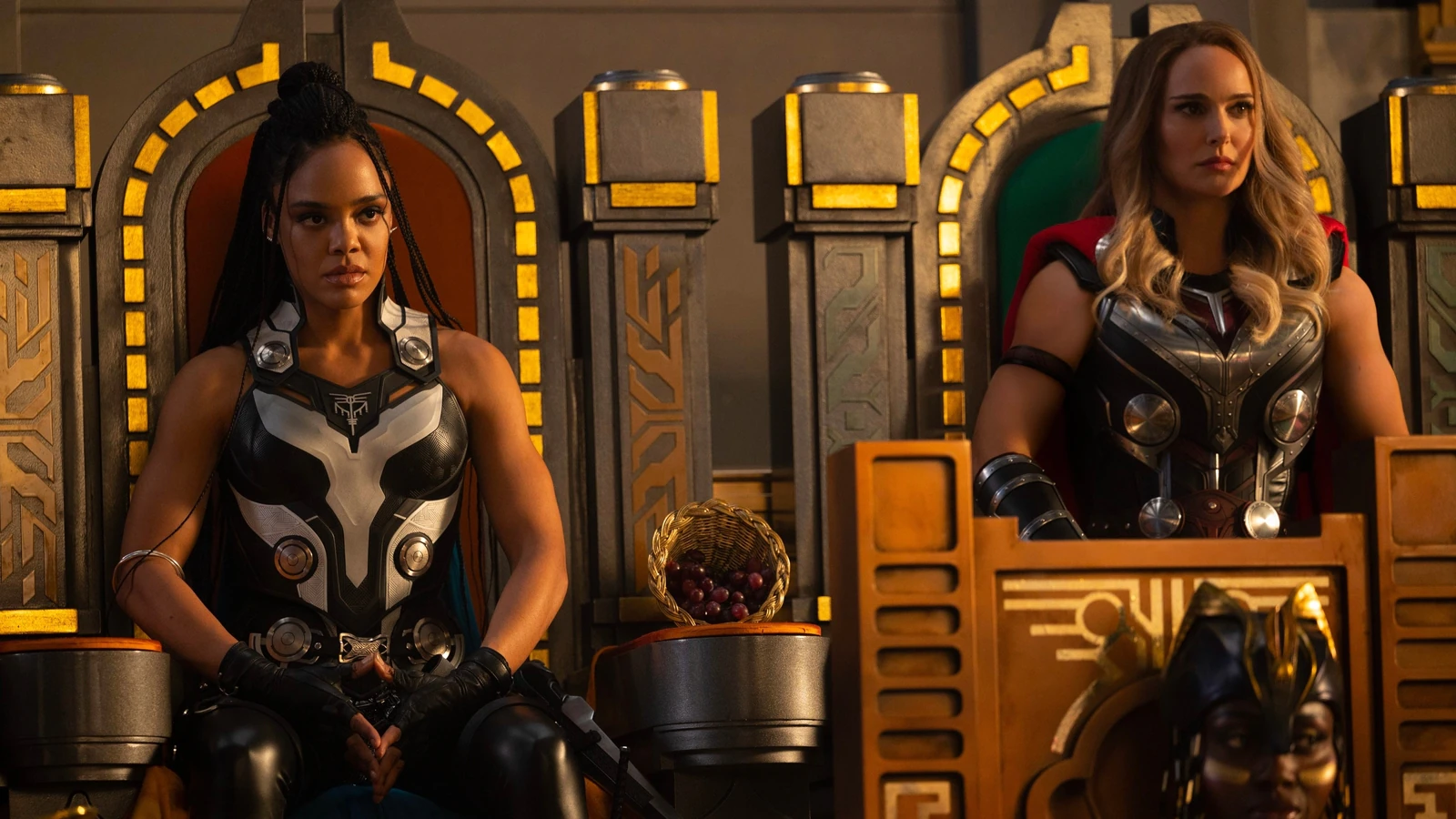They say never to play a drunk as a drunk. It’s probably also true that if you’re trying to make an audience laugh, never act as if you think you’re fall-down funny. The extent to which one enjoys Thor: Love and Thunder, will depend upon a tolerance for an overplayed hand of wink-wink, nudge-nudge so broad as to suggest that hundreds of millions of dollars were spent aspiring to little else than a trivial wank. Such prevalent, self-conscious irreverence topples the picture’s messy first half, which feels like one big in-joke sans a compelling story.
Director Taika Waititi, who winningly helmed the series’ last installment (and perhaps apex) in Thor: Ragnarok, has exponentially upped that picture’s light comic touch which this time feels like too much of a (formerly) good thing. This time it plays as “Hey, audience, we’re just entertaining ourselves here, taking this none too serious.” So why, then, should we?
As the 29th (!) Marvel franchise picture, this one sees dual plots in play, bringing back Jane Foster (Natalie Portman lending elegance), the brilliant astrophysicist who happens to be Thor’s ex and is also now battling stage 4 cancer. At the same time, Christian Bale turns up as a new villain named Gorr the God Butcher, seeking revenge against all gods in the universe after the death of his adolescent daughter.
Gorr gains possession of something called the Necrosword (don’t ask me; there are no rules to any of this) which is apparently capable of slaying the gods. His plan? He kidnaps Asgard’s children in an effort to lure the gods to him, which works in the case of Thor (Chris Hemsworth) and Jane, who becomes a sort of temporary goddess by picking up Thor’s old hammer, which also staves off her cancer but weakens her system’s resistance to treatment. Save the universe or save herself? The picture deals with this dilemma briefly but tenderly in its second half.
Along for the ride are Asgard’s King Valkyrie (Tessa Thompson) and Kronan rock man Korg (superbly voiced by Waititi, getting laughs), the merry band making their way to a place called Omnipotent City in the film’s centerpiece and best sequence, featuring movie-stealing Russell Crowe, having a ball in very, very funny performance as Zeus, replete with a broad Greek accent and inspired sense of humor, which would be welcome in future projects.
Thor: Love and Thunder is simply too much and not enough. Too many Guns & Roses songs on the soundtrack (wow, cool!) and not enough of a compelling villain. Too many in-jokes and not enough development between Thor and Jane to make us truly feel much at stake. Too many callbacks and a relentless need to tie together the “Marvel Cinematic Universe” (the Guardians of the Galaxy even appear in the opening) and not enough originality in storytelling.
For this critic a profound sense of fatigue has set in with all things Marvel and the relentless need to create so many films and make sure they all “fit” together as a whole. They are clearly made for their audience, but shouldn’t good movies be for everyone and stand independently regardless of whether a viewer as seen two, eleven, twenty-three or zero of the other films?
Hemsworth, game as ever and with impeccable comic timing, fulfills what’s required—stunning looks, can turn a joke and is convincing in battle. Yet the actor, who has demonstrated dramatic chops in movies like Ron Howard’s racing drama Rush, could and should be doing something more at this point in his career than playing superhero comic relief, significantly beneath his abilities. As the Waititi era has now redefined Thor as a goofball (and sometimes dim-bulb) incarnation, it may prove difficult for the star to move on from in later installments.
Ditto the gifted Portman; all one can think of here is that the Oscar winner, like so many other genius actors today, is putting in her requisite time for a paycheck and potential commercial longevity. It is telling that the best moment in the film for both stars is one set in a hospital room having nothing to do with comic larks or CGI showdowns, but rather some simple and direct human emotions—and the film could have used more.
Bale offers his typical immersive commitment, but his Gorr is somewhat elusive and far from a top-tier Marvel villain. Thompson, coming off a sublime dramatic portrait in last year’s Passing, delivers the film’s smartest and most appealing performance.
Waititi, the genius actor and filmmaker from New Zealand behind What We Do in the Shadows, JoJo Rabbit and other successfully pointed comedies that know how to balance humor and character, overshoots here with too much tone and not enough substance.
Unless you’re a completist, pass on this one.
2 stars



